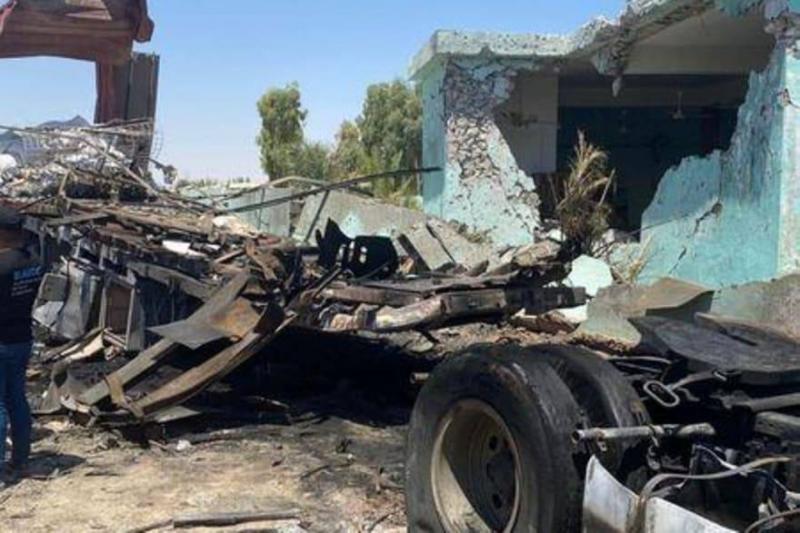Three sources from armed factions and two informed Iraqi security sources reported that a senior leader of the Iranian Revolutionary Guard called on the Shiite armed factions in Iraq to intensify attacks against American targets during a meeting held in Baghdad last week. American forces in Iraq and Syria have faced multiple attacks following a visit by an Iranian delegation led by Hossein Taeb, head of Revolutionary Guard intelligence, which came after U.S. airstrikes against Iranian-backed armed factions on the Syrian-Iraqi border on June 27.
The three sources from the armed factions that provided information about the meeting stated that while the factions were encouraged to seek revenge, the Iranians advised Iraqis against going too far to avoid significant escalation. One of the sources, a senior leader of a local armed faction who attended the meeting, indicated that the Iranians advised them to expand their attacks by conducting retaliatory operations against American forces in Syria.
This comes amid significant disagreements overshadowing diplomatic efforts to revive the 2015 Iran nuclear deal, from which former U.S. President Donald Trump withdrew. A senior regional official informed by Iranian authorities about Taeb's visit noted that the head of Revolutionary Guard intelligence met with several leaders of Iraqi armed factions during the visit and conveyed to them "the supreme leader's message to continue pressuring American forces in Iraq until they leave the region."
Since the U.S. airstrikes, attacks on American forces and military personnel or bases they operate in Iraq have increased and expanded into eastern Syria. The Iranian Foreign Ministry did not immediately respond to questions from Reuters regarding this report, and it was not possible to reach officials in the Revolutionary Guard's public relations office for comment. The Iranian ambassador to the United Nations denied this month U.S. accusations that Tehran has supported attacks on American forces in Iraq and Syria and condemned the U.S. airstrikes against Iranian-backed armed factions there.
There was also no immediate response from the Iraqi government or the office of the Iraqi Prime Minister regarding inquiries about the meeting. The sources spoke to Reuters on the condition of anonymity due to the sensitivity of the topic.
### U.S.-Iran Competition
Iraq, the largest Arab country with a Shiite majority, has been a theater for U.S.-Iranian competition since the U.S.-led invasion that toppled Saddam Hussein in 2003. The Shiite armed factions have launched a continuous and increasingly sophisticated campaign against American forces, which withdrew from Iraq in 2011 but returned in 2014 at the head of a coalition to fight the Islamic State.
However, attacks, including those utilizing explosive drones, have escalated since the U.S. airstrikes, which the Iranian-aligned armed factions claim killed four of their members. The two Iraqi security sources familiar with the activities and operations of the armed factions indicated that the Iranians provided their Iraqi allies with aerial maps of American locations in eastern Syria during the meeting held on July 5.
The U.S. Department of Defense (Pentagon) expressed serious concern regarding the attacks, including a barrage of rockets on July 7 against Ain al-Asad airbase, during which two American soldiers were injured.
Taeb, a prominent figure in the Revolutionary Guard and a mid-ranking Shiite cleric, is considered by insiders of Iranian political affairs and analysts to be close to Supreme Leader Khamenei. A senior regional official indicated that Khamenei dispatched Taeb to Iraq following the unsuccessful visits of Brigadier General Ismail Qaani, who was appointed last year as the commander of the Quds Force of the Revolutionary Guard, to escalate pressure.
An Iraqi government official suggested that Iran appears to be seeking to use its allies in Iraq to pressure for a return to the nuclear agreement, which would see U.S. sanctions lifted in exchange for restrictions on Iran's nuclear activities. A senior Iranian diplomat stated that Taeb's visit to Baghdad indicates Khamenei's direct involvement in Iraqi affairs following the assassination of Qassem Soleimani, the former Quds Force commander, in a U.S. drone strike in Iraq early last year.
A spokesperson for one of the Iranian-backed armed factions, which was targeted in the U.S. airstrike last month, confirmed that recent attacks were carried out by "Iraqi Islamic Resistance," referring to the Iranian-backed Shiite armed factions. Kazem Al-Fartousi, spokesperson for "Brigades of Sayyid al-Shuhada," told Reuters that military escalation against American forces will continue until all their combat troops leave Iraq.
Saeed Al-Saadi, a senior official in the political office of the Iranian-backed faction "Asa'ib Ahl al-Haq," warned that American forces should expect more effective attacks anywhere in Syria and Iraq if the U.S. continues targeting their factions.
Two faction leaders reported that the meeting took place in the upscale Jadiriya neighborhood in Baghdad, in a villa facing the American embassy across the Tigris River.
Iran and the United States began indirect talks in Vienna in early April to return to compliance with the nuclear agreement. There has been no rescheduled date for further negotiations, which were postponed on June 20. Some Western and Iranian officials have indicated that the talks are far from yielding results, with ongoing disagreements over the U.S. sanctions that should be lifted and the nuclear commitments that Iran must fulfill.




